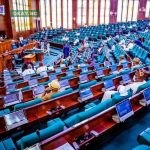Rotimi Amaechi
The minister of transport has urged the National Assembly to pass the proposed National Transport Commission bill into law so that the private sector can operate and manage trains, rolling stock as well as their own tracks.
Speaking to the joint members of the National Assembly, who were on oversight function at the ministry of transport on Monday, the minister said the bill, when passed, will replace the 1955 NRC Act and enable the separation of operator from regulator.
The minister also explained that in order to free the existing narrow gauge tracks from its sub-optimal conditions occasioned by underutilisation of its installed capacity and put it on the path of becoming the desired enabler from growth in Agro allied, mining and industrial manufacturing sector, the 3,505km comprising Lagos -Kano, Port Harcourt-Maiduguri and Zaria-Kaura Namoda narrow gauge rail system have been slated for concession to a consortium of international reputable operators led by General Electric (GE) of the US.
While enumerating some of the activities of the ministry in this year, Amaechi further said the Nigeria Railway Corporation has completed the rehabilitation of Western line Lagos to Kano and the Eastern railway lines up to Gombe.
Also, he said the federal government has signed the contract for the construction of Calabar-Port Harcourt rail line; while the Warri-Ajaokuta-Baro-Abuja central railways have been properly placed on the part of Public Private Partnership.
He explained that when this arrangement comes through after being subjected to the Infrastructure Concession Regulatory Commission’s evaluation and due process, it will draw a minimum of US$3billion in investment for Nigeria.
While responding to the ministry, the chairman, senate committee on Land Transport, Senator Olugbenga Ashafa said the committee is keen on scrutinising the capital expenditure and budgetary performances of the ministry.
He however, berated the ministry for failing to provide advance information on budgetary performance before the visitation proper, which would have given the committee opportunity to do diligent work before visitation.







